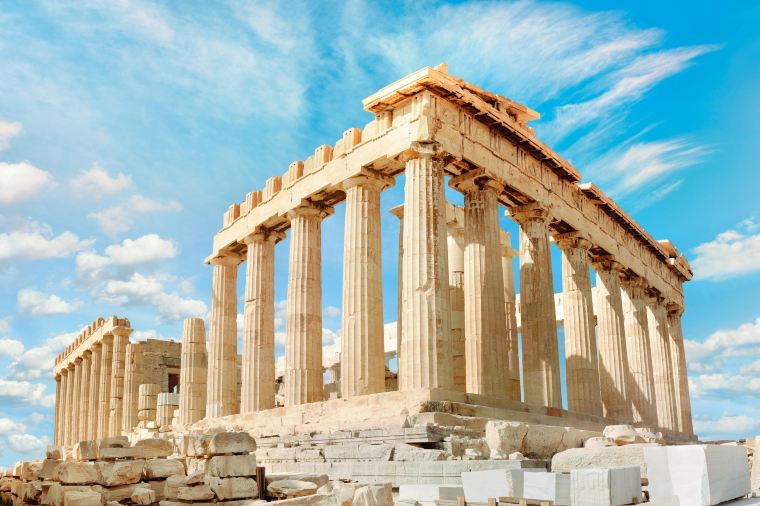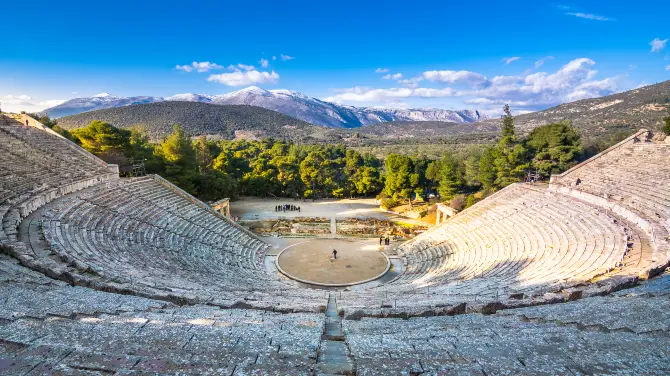
Are you dreaming of a picturesque Mediterranean vacation filled with ancient ruins, crystal-clear waters, and delectable cuisine? Look no further than Greece, a country that offers a harmonious blend of history, natural beauty, and vibrant culture. But when is the best time to visit Greece?
In this comprehensive guide, we will explore the optimal seasons for your Greek adventure, taking into consideration factors such as weather, crowd levels, and cultural festivities. So, pack your bags and get ready to immerse yourself in the wonders of Greece!
Best Time To Visit Greece

Perfect weather to explore The Parthenon
Greece boasts a diverse climate with distinct regional variations, making it a year-round destination. However, depending on your preferences and the experiences you seek, certain seasons may be more favorable than others. Let's delve into the best time to visit Greece based on different factors:
- Weather
- Crowd levels
- Cultural Festivities
Weather
The Mediterranean climate of Greece ensures mild winters and warm summers, but regional variations can influence the overall climate in different parts of the country. Here's a breakdown of the weather conditions throughout the year.
Spring (March to May)

Explore the Old Venetian Port of Chania
Spring brings blooming landscapes, pleasant temperatures, and fewer crowds, making it an ideal time to explore Greece. The weather gradually warms up, with temperatures ranging from 15°C (59°F) to 20°C (68°F).
It's the perfect season for outdoor activities, such as hiking through the idyllic landscapes of Crete or exploring the historical sites of Athens.
Summer (June to August)

Summer time at Oia
Summer in Greece is synonymous with sunny days, azure waters, and lively beach vibes. This is the peak tourist season, attracting visitors from all corners of the globe. Expect temperatures ranging from 25°C (77°F) to 35°C (95°F), especially in popular destinations like Santorini and Mykonos. It's the ideal time for sunbathing, island hopping, and indulging in vibrant nightlife.
Autumn (September to November)

Explore the charming Imerovigli Town
Autumn ushers in a pleasant transition, with mild temperatures and fewer crowds compared to summer. The weather remains comfortably warm, ranging from 20°C (68°F) to 25°C (77°F), allowing you to explore ancient ruins and charming villages without the scorching heat.
Autumn is also an excellent time to witness traditional festivals and harvest celebrations across Greece.
Winter (December to February)

Visit historic site - Monument to the Unknown Soldier
Winter brings a different kind of charm to Greece, with fewer tourists and a cozy atmosphere. Temperatures range from 10°C (50°F) to 15°C (59°F), but can drop lower in northern regions and mountainous areas.
Although the islands are quieter during this season, it's an opportune time to explore historical sites, enjoy cultural events, and experience the festive spirit during Christmas and New Year.
Crowd Levels
The ebb and flow of tourist crowds can significantly impact your travel experience. Let's see how the seasons affect crowd levels in Greece.
High Season (June to August)

Dine at Little Venice
During the summer months, Greece is teeming with tourists seeking sun, sea, and a taste of Greek culture. Popular destinations such as Athens, Santorini, and Mykonos can get crowded, with long queues at attractions and higher accommodation rates. If you're planning a visit during this period, it's essential to book in advance to secure the best deals.
Shoulder Season (April to May and September to October)
The shoulder seasons offer a delightful balance between favorable weather conditions and manageable crowds. In spring and autumn, you can explore popular sites without feeling overwhelmed by crowds, making it easier to capture stunning photographs and savor the serene beauty of Greece. Additionally, hotel prices and airfare may be more budget-friendly during these months.
Low Season (November to March)

Explore hidden gems in low season - Agion Taksiarchon Church
Winter is considered the low season in Greece, especially for beach destinations. While the islands may be quieter, major cities like Athens still buzz with activity. This is an opportune time to enjoy cultural experiences, interact with locals, and take advantage of off-season discounts. If you prefer a more relaxed atmosphere and don't mind cooler temperatures, winter can be a hidden gem for your Greek escapade.
Cultural Festivities
Immersing yourself in the rich tapestry of Greek traditions and celebrations can enhance your travel experience. Here are some notable cultural festivities that you might want to consider when planning your visit.
Easter Celebrations
Greece celebrates Easter with great fervor, combining religious rituals and cultural traditions. Experience the solemn Good Friday processions, followed by the joyous Resurrection festivities on Holy Saturday. From candlelit processions to feasts of succulent lamb, Easter in Greece is a vibrant celebration worth witnessing.
Athens and Epidaurus Festival

Majestic backdrop at Epidaurus Theater
If you're a fan of performing arts, the Athens and Epidaurus Festival is a must-attend event. Running from May to October, this renowned festival features theatrical performances, live music, and dance shows.
The ancient Epidaurus Theater, known for its remarkable acoustics, serves as a majestic backdrop for some of the performances.
Ohi Day (October 28th)
Ohi Day, also known as the "Day of No," commemorates Greece's refusal to surrender during World War II. This national holiday is celebrated with military parades, festive processions, and school pageants. Join the locals in paying tribute to Greek heroes and immerse yourself in the patriotic spirit that fills the streets.
Do check out our Greece travel guide for more ideas and things to do for your trip!
FAQs: Best Time To Visit Greece
Best Time To Visit Greece Conclusion
Now that you have a comprehensive understanding of the best time to visit Greece, you can plan your dream Mediterranean getaway with confidence.
Whether you prefer the vibrant energy of summer, the mild temperatures of spring and autumn, or the intimate charm of winter, Greece has something to offer every traveler. Immerse yourself in the rich history, breathtaking landscapes, and warm hospitality of this enchanting country.
Book your tickets, pack your sunscreen, and get ready to create unforgettable memories in Greece!


